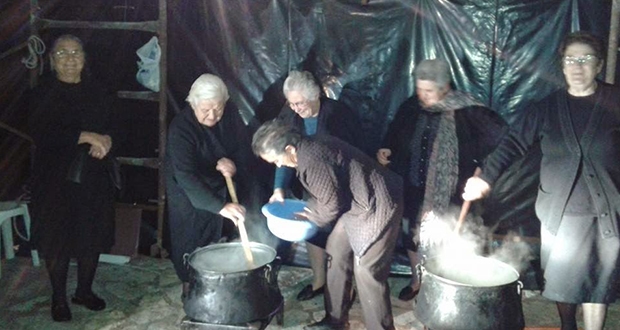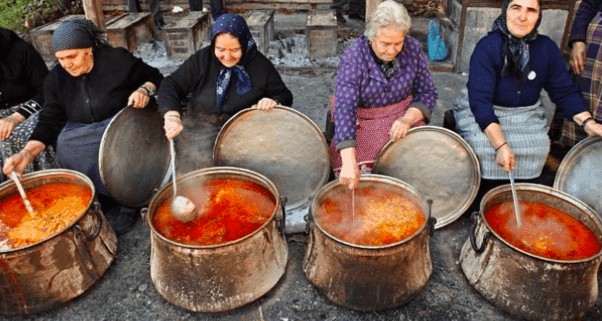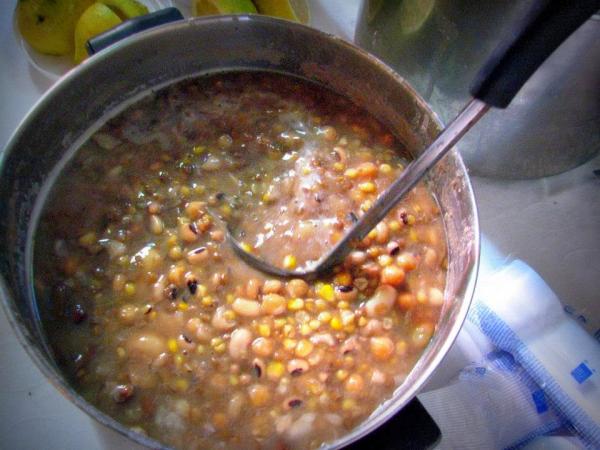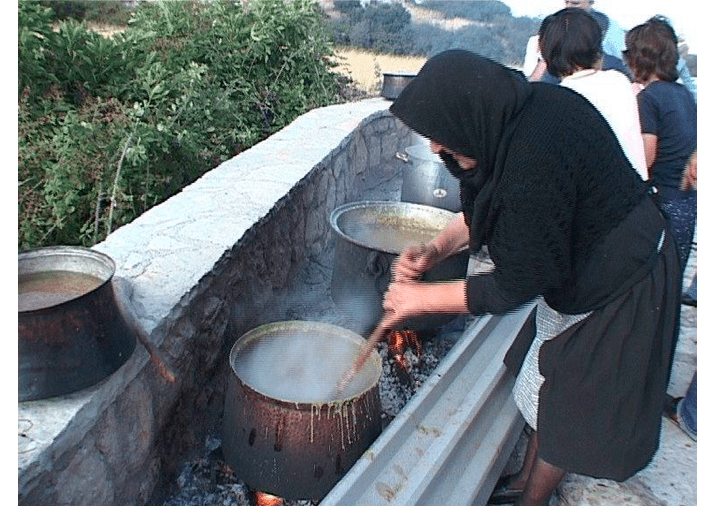November 21st is a big celebration in the Greek Orthodox calendar as it is the Isodia Tis Theotokou- The Feast commemorating when the Panagia entered the Temple in Jerusalem as a young child.

It is also a day where traditionally every Mama & Yiayia in many Greek villages are on a mission, gathering as many Polysporia (legumes) as they can- including all types of beans, corn, peas, wheat, and lentils and cooking all the seeds together for a big family feast.
This feast is also known as Panagia Mesosporitissa (Panagia= Virgin Mary, mesos= middle, sporos= seed), Panagia Archisporitissa (archisporitissa = the sowing begins), Panagia Aposporitissa (= the sowing is over) or Polysporitissa (many seeds) because of the offering of legumes and grains of the latest harvest.
The Sporous are traditionally boiled together and taken to the village church to be blessed by the priest. On the eve and before the morning of November 21, Yiayia would go to the village fountain and pour a tablespoon of polysporia, a few coins, a little wine and raki and say, “Οποs τρεχειτονερονατρεχειτοβιο.”

This was a prayer to God for a good food supply for their children, like the never-ending water in the springs.
After that, families would gather, eat soup bowls, and celebrate with their neighbours and the rest of the village at the Panigiri (festival).
Today, many Greek ladies in Greece and around the world still hold this tradition by cooking enormous pots of Fakes (lentils) or Fassolada (beans) on November 21 each year.

The "polysporia" tradition was revived again this year in the area of ancient Eleusis last night, on the eve of Isodia Tis Thetokou, where residents of the area gathered at the local folklore museum with boiled legumes and wheat, based on the tradition of offering the type of crop each family cultivated throughout the year.
The Polysporia were then distributed in small plastic cups after the evening liturgy to worshippers at the Church of Panagia Mesosporitissa, which crowns a hill in the ancient cult centre of Demeter.

The church was built over the ancient Telesterion, and last night, locals celebrated and offered prayers for the earth's fertility, guaranteeing good crops.
According to Culture Minister Lina Mendoni, Greece is promoting this tradition for inclusion in UNESCO's intangible cultural heritage list. Mendoni said at a recent press conference, "This is a wonderful tradition which in reality is a revival of a corresponding tradition of antiquity."
Greek Beans and Grains Soup (Polysporia)
Serves 4-6
Greek Beans and Grains Soup is tart, chewy, creamy, herby, and all-around delicious. It’s great for lunch or dinner, paired with Rustic Greek cornbread and a light green salad. If you’re like me, you’ll also eat it for breakfast. To make the soup vegan be sure to use vegetable stock or water (it’s richer if made with stock).
3 cups diced yellow onion, 1/4” dice
2 Tbsp. olive oil
Salt
Freshly ground black pepper
2 Tbsp. minced garlic
2 cups Bob’s Red Mill Beans and Grains Soup Mix, rinsed under cold water
8 cups vegetable or chicken stock or water
1 tsp. kosher or coarse salt
2 cups thinly sliced green onions, green and white parts both
2 Tbsp. Minced fresh dill or 2 tsp. dried dill
1/3 cup fresh lemon juice
1 1/2 tsp. finely grated lemon peel
Extra dill for garnish
In a large pot, sauté onions, lightly seasoned with salt and freshly ground black pepper, in olive oil. Add garlic and cook for 1 minute. Stir in Beans and Grains, stock, and 1 tsp. Salt. Bring to a boil, cover, turn the heat low, and simmer for 1 1/2 hours or until beans are tender. When beans are done, stir in green onion, dill, lemon juice, and lemon peel. Cook for 5 minutes. Taste and add salt, freshly ground black pepper, dill, or lemon juice, as needed. Garnish with dill and serve immediately.
NOTE: You can turn this recipe into a salad. To do so, use 6 cups stock, don’t cover the pot while it simmers, and cook liquid down until it’s almost gone, stirring regularly to prevent burning. When the beans are done, stir in onions, dill, lemon juice, and lemon peel. Serve hot or at room temperature.

